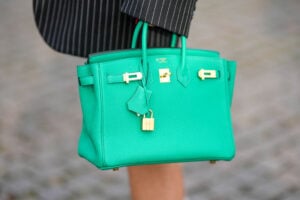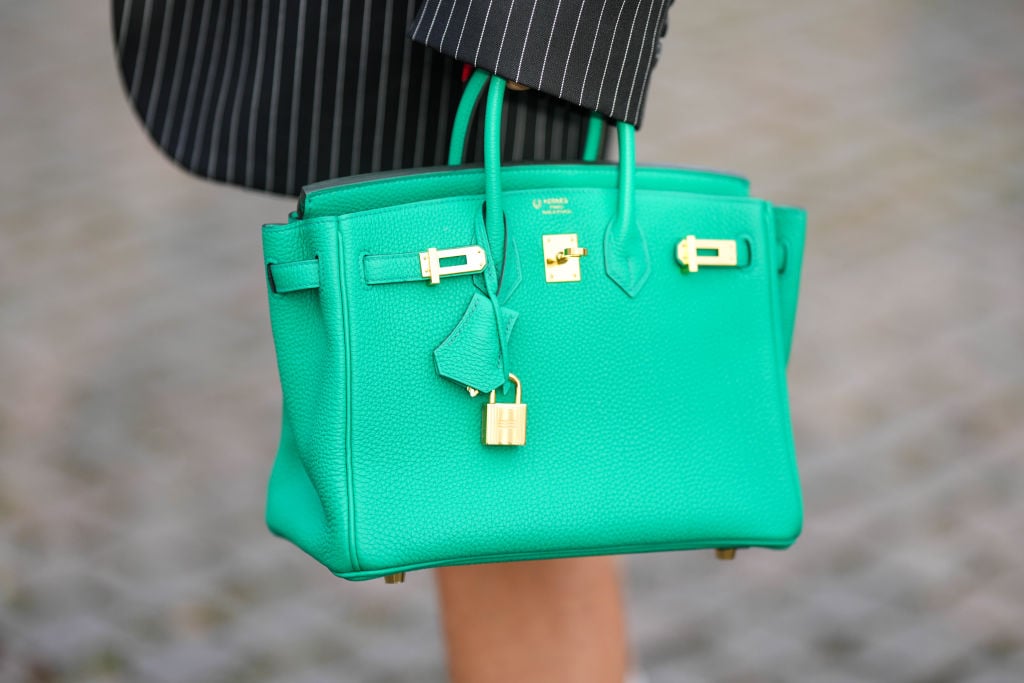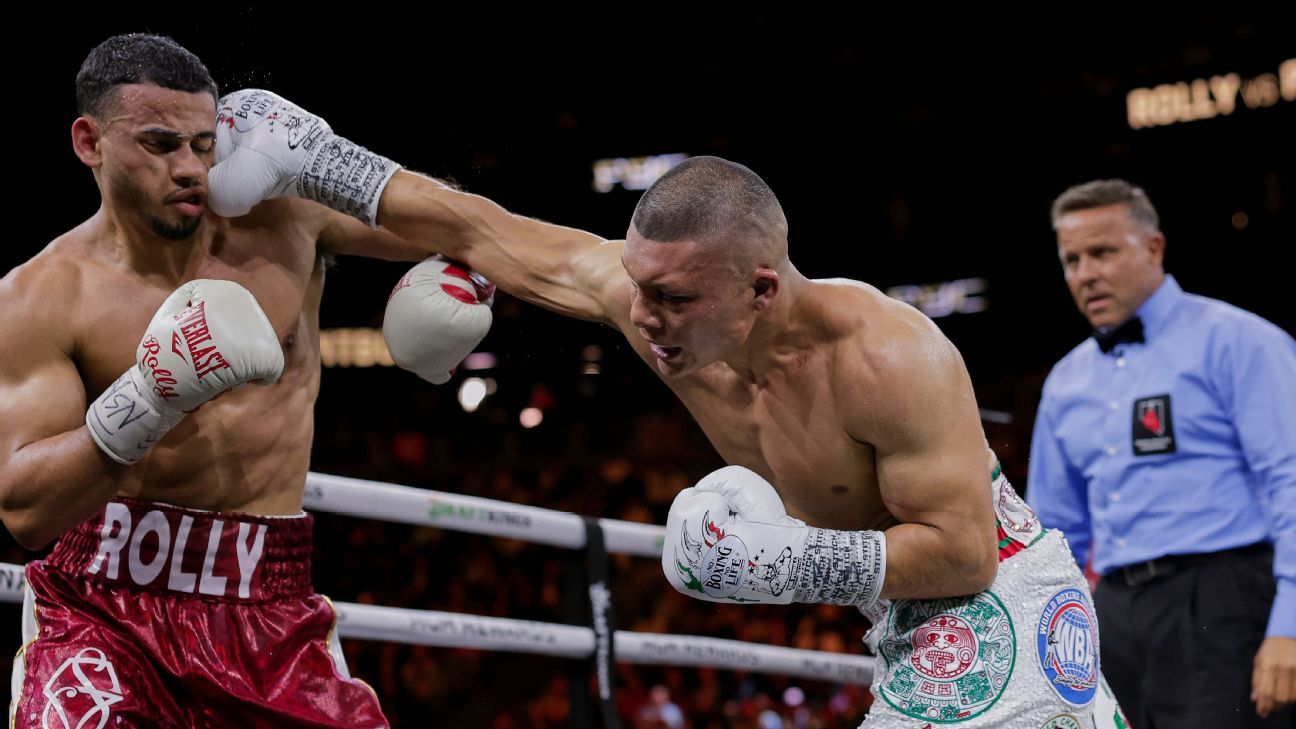How Did Hermès Wind Up In This Hot Antitrust Mess?
[ad_1]

(Photo by Edward Berthelot/Getty Images).
The day has finally come where frustrated Hermès customers are challenging the brand for making them play their games in order to purchase the popular Birkin handbag. The rules of this game require that customers purchase a certain amount of ancillary goods such as scarves or belts and jewelry to qualify for a Birkin. A class action was filed last Tuesday in the Northern District of California accusing Hermès of antitrust and unfair business practice due to this tactic.
Plaintiffs Cavalleri and Glinoga both attempted to purchase a Birkin bag but were counseled by Hermès sales associates to spend more on ancillary products to obtain access to a Birkin. The plaintiffs highlight that “consumers cannot simply walk into a Hermès retail store, pick out the Birkin handbag they want and purchase it.” In fact, the complaint claims that “the handbags will not be displayed on the sales floor for the general public … [and] most consumers will never be shown a Birkin handbag at a Hermès retail store.” The complaint continues by noting that “[t]Ypically, only consumers who are deemed deserving of purchasing a Birkin will be shown the Birkin handbag in a private room. The greater their “purchase history” of ancillary products, the more “worthy” Hermès considers a customer to be.
The complaint provides that Hermès’s game is further encouraged by the compensation structure for its sales associates. Hermès sales associates receive a 3% commission on ancillary products, a 1.5% commission on non-Birkin handbags, and no commission on the sale of Birkins. The complaint claims that sales associates “are instructed by Defendants to use Birkin handbags as a way to coerce consumers to purchase ancillary products sold by Defendants … in order to build-up the purchase history required to be offered a Birkin handbag.”
The plaintiffs specifically claim that Hermès’s tying arrangement violates the Sherman Act, 15 U.S.C. § 2, which prohibits “monopoliz[ation] [of] “Any part of trade or commerce between several states or foreign nations.”
A tying agreement is an agreement where the seller conditions the purchase of one product (“tying”) on the buyer agreeing to buy a separate product (“tied”) from the seller. The plaintiffs claim that “the availability of Birkin handbags depends on customers buying ancillary items.” In this case, plaintiffs claim “[t]”The tying products, the Birkin Bags, are separate and distinct from tied products, which are the ancillary goods that consumers have to purchase, because consumers, such as Plaintiffs, have alternative options and would prefer to select among them independently of the decision to purchase Birkin bags.” Thus, Hermès’s tying arrangement “ties two separate products that are in separate markets.”
Tying arrangements do not have to be illegal. Tying arrangements are not necessarily illegal. However, they can become unlawful if the seller has the economic power to restrict free trade in the market of the tied product. The plaintiffs assert that Hermès has “sufficient economic power in the market for Birkin handbags to coerce at least some consumers into purchasing ancillary products from Defendants.”
The plaintiffs also accuse Hermès of violating various California statutes for the same reasons described in their Sherman Act claim. For example, the plaintiffs claim that Hermès violated the Cartwright Act (Cal. Bus. & Prof. Code, § 16720, 16726), which prohibits the “combination” of resources by two or more persons to restrain trade or commerce, or to prevent market competition. The plaintiffs alleged that “under the Cartwright Act, a ‘combination’ is formed when the anticompetitive conduct of a single firm coerces other market participants to involuntarily adhere to the anticompetitive scheme.”
The plaintiffs seek a class certification, an injunction preventing Hermès from continuing to engage in the practices set forth in the complaint, and an award of monetary damages.
The outcome of this case is uncertain. The judicial treatment of tying has changed over time. In the 1940s, opinions were released by the Supreme Court that showed skepticism toward tying. In particular, International Salt Co., Inc.The Supreme Court ruled that the company’s practice of forcing customers who lease industrial machinery to only buy salt from them violates antitrust laws. The court argued that the likelihood of a monopoly in salt was “obvious,” because the “volume” of business (annual sales of the salt used in machines were around $500,000) couldn’t be called “insignificant or insubstantial.” In Standard Oil Co. of California, v. United StatesThe Supreme Court has stated that “[t]”Ying agreements serve little purpose other than to suppress competition.”
In 2006, however, the Supreme Court “rejected’ its previous dicta, that tying served “hardly any purpose other than the suppression of the competition.” In Illinois Tool Works Inc v. Independent Ink, Inc.The Supreme Court ruled that the lower court’s presumption “that a patent always gives a patentee significant marketing power” for a tying item is invalid. It also held that in all cases involving a tie-up arrangement, the plaintiff has to prove that the defendant has a market position on the tying item.
Plaintiffs also face other obstacles, besides the courts’ tolerance of tying practices. Their case centers on Hermès’s “tying policy,” which is more complicated than depicted by the plaintiffs. While sales associates take into account the customer’s purchase history, they also consider other factors, such as their involvement in the fashion world or their social following as well as their strength of relationship with the customer. Furthermore, Hermès’s policy varies depending on the store location. For instance, securing a Birkin at the Paris Hermès store, even without any purchase history, is quite feasible due to its larger inventory.
Susan Scafidi of Fordham University’s Fashion Law Institute said in a Washington Post piece that “Hermes has the game in hand.” She pointed out that there is no formal policy defining minimum spending requirements. This makes it difficult to prove that buyers are being forced to buy ancillary items.
This case is important because its outcome may have an impact on other major brands. While the Hermès game is widely recognized in luxury circles, many luxury brands incentivize customers to build purchase histories by reserving special privileges for their most loyal patrons.
Nicolette Shamsian became a fashion law contributor for Above the Law in 2023. Nicolette Shamsian received her B.A. (summa cum laude) in Political Science from the University of California Los Angeles, and her Juris Doctor degree from UCLA School of Law. Nicolette focuses her work on intellectual property litigation. Nicolette is a fashion law aficionado who enjoys leading discussions on notable fashion law cases..
[ad_2]


